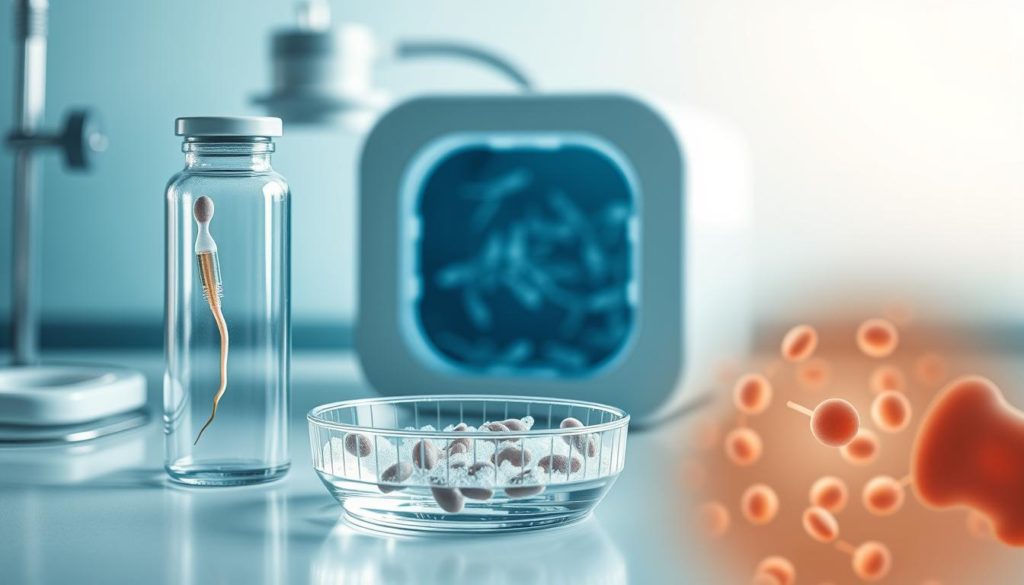Did you know nearly 90% of men with prostate cancer live at least five years after treatment? This news is hopeful. Yet, many survivors wrestle with fertility issues post-cancer. It’s vital for those desiring to grow their families to understand fertility after prostate cancer.
Men aiming to preserve fertility post-prostate cancer should learn how treatments affect reproductive health. Surgery, radiation, hormone therapy, or chemotherapy each pose unique challenges. But, there are ways to help survivors achieve their family plans.
This guide will cover preserving fertility before treatment, solutions after, and the emotional journey involved. We’ll closely examine the path to navigating fertility post-prostate cancer. Plus, we’ll explore advances made in reproductive health for survivors.
Understanding the Impact of Prostate Cancer Treatment on Fertility
Prostate cancer treatments can greatly affect a man’s ability to father children. It’s important for men to understand how these treatments can impact their fertility. This section looks into the effects of surgeries and therapies on male fertility.

Effects of Radical Prostatectomy
Radical prostatectomy involves removing the prostate gland and seminal vesicles. This process stops semen from being ejaculated, leading to male infertility post prostate cancer. Even though it helps fight cancer, it poses big problems for a man’s fertility afterwards.
Consequences of Radiation Therapy
Radiation therapy can harm tissues important for moving semen. Doctors try to limit tissue damage by carefully planning the radiation dose. However, the semen made after this treatment often doesn’t carry sperm well. This shows the struggle in tackling infertility after prostate cancer.
Impact of Hormone and Chemotherapy
Hormone therapy and chemotherapy can lower sperm count and semen production. This makes natural conception challenging, leading to the need for special sperm quality treatment. These treatments add layers of difficulty to fertility issues after beating prostate cancer. They highlight the importance of seeking help for fertility.
Preserving Fertility Before Prostate Cancer Treatment
Before treatment for prostate cancer begins, it’s vital to look into ways to save fertility. Knowing your options can really change your future family plans. Let’s look at the main strategies to keep in mind.
Sperm Banking
Sperm banking is a top choice for keeping fertility. It means freezing sperm to use later. This method works well because it lets men save their fertility before starting treatment that could harm their ability to have kids.

- Procedure: Sperm is taken through ejaculation then frozen with special freezing methods.
- Advantages: It’s easy, very successful, and can protect against losing the ability to have kids.
- Considerations: It’s best to plan ahead since you should do this before beginning radiation or chemotherapy.
Consulting a Fertility Specialist
Talking to a fertility expert is also key. They give personalized help and cutting-edge options for each person’s situation.
It’s crucial to talk fully with your healthcare team on wanting kids in the future. Experts give specific advice on saving sperm and other ways, like taking sperm out if it’s hard to ejaculate after surgery.
With these choices for saving fertility, men can plan for having children after their treatment.
Fertility After Prostate Cancer: Options and Solutions
Prostate cancer treatments can affect men’s ability to have children. But, there are options available after treatment. These options can help men still become fathers despite cancer challenges.
Sperm Extraction Techniques
Sperm extraction post prostate cancer is a good choice for those affected. It involves getting sperm right from the testicles. Techniques include:
- Testicular Sperm Extraction (TESE)
- Microsurgical Epididymal Sperm Aspiration (MESA)
- Testicular Sperm Aspiration (TESA)
Thanks to these methods, many men have fathered children after cancer treatments.
Artificial Insemination
Artificial insemination after cancer offers hope too. It uses sperm saved before treatment starts. The steps are:
- Collection and freezing of sperm before treatment
- Thawing and preparing sperm for insemination
- Inseminating the partner to attempt pregnancy
While the success rates are below 50%, this path provides a chance to start or expand families after prostate cancer.
| Method | Procedure | Success Rate |
|---|---|---|
| Sperm Extraction | Directly from testicular tissue | Variable |
| Artificial Insemination | Using thawed, banked sperm |
How Radiation Therapy Affects Male Fertility
Radiation therapy can hurt male fertility, especially affecting the seminal vesicles and nearby areas. Doctors face a tough job. They need to treat cancer without harming reproductive organs too much.
Damage to Seminal Vesicles
Radiation therapy used for prostate cancer might harm the seminal vesicles. These glands help move semen. Damage here can lead to issues with semen transport after treatment. This makes it hard for semen to carry sperm, which affects fertility.
Accuracy in Radiation Dose Planning
Better planning in radiation doses is crucial to reduce harm to male fertility. This allows doctors to target cancer cells more carefully while saving healthy tissue. It helps keep sperm production going and solves semen transport problems after therapy. New methods aim to treat cancer without losing sperm quality.
Doctors are working hard to lower radiation therapy’s harsh effects on male fertility. Their efforts give hope and options to those affected.
Surgical Options and Their Impact on Reproductive Health
Operations for prostate cancer, like radical prostatectomy, affect one’s ability to have kids. Knowing about these effects is vital for those wanting to be dads after treatment.
Radical prostatectomy takes out the prostate gland and seminal vesicles. These parts are crucial for natural conception. So, this surgery directly impacts reproductive health, as these organs are important in ejaculation.
But, being informed and consulting with a doctor can help deal with these issues. Below, you’ll find a comparison of how different surgeries affect reproductive health:
| Surgical Option | Impact on Reproductive Health |
|---|---|
| Radical Prostatectomy | Removal of prostate and seminal vesicles, leading to a complete loss of natural ejaculation. |
| Nerve-Sparing Prostatectomy | Attempts to preserve nerves essential for erections, but still impacts ejaculation. |
| Transurethral Resection of the Prostate (TURP) | Minimally invasive but can result in retrograde ejaculation. |
It’s key to think about these surgery consequences when planning for life after treatment. Talking with healthcare experts on possible impacts and looking into options like sperm banking before surgery can help with managing expectations and results.
Assisted Reproductive Technologies for Male Cancer Survivors
Beating prostate cancer is tough, but it doesn’t mean giving up on fatherhood. Today’s assisted reproductive technologies open new doors for male cancer survivors to become parents. IVF and ICSI are two methods that offer hope for a family after prostate cancer.
In Vitro Fertilization (IVF)
IVF is a powerful option for those who’ve survived cancer. It involves mixing sperm and an egg outside the body. Then, the embryo is placed into the uterus. This method has helped many overcome the fertility issues cancer treatment can cause.
Intracytoplasmic Sperm Injection (ICSI)
ICSI is another key tool. It injects a single sperm directly into an egg. It’s great for guys with low sperm count or poor sperm quality after beating cancer. ICSI boosts fertilization chances, bringing hope to families looking to grow.
Thanks to these technologies, prostate cancer survivors have a bright path to parenthood. They offer a way to overcome challenges and fulfill dreams of having children.
Emotional and Psychological Considerations
Dealing with prostate cancer treatment can deeply affect your feelings about having kids after. It’s vital to face these challenges together, by talking openly, getting professional help, and understanding what both of you are going through.
Coping with Fertility Issues
Fertility changes can make you feel stressed. It’s crucial to use coping methods:
- Seek Information: Learn about your fertility options after cancer.
- Practical Advice: Find ways to handle concerns about your sex drive and health.
- Emotional Support: Talk to a therapist or counselor to deal with your feelings and concerns.
Support for Partners
Partners face their own hurdles too. It’s important to help each other with these fertility issues. This keeps your bond strong. Ways to help include:
- Open Communication: Talk honestly and openly about what you’re feeling and expecting.
- Joint Counseling: Couples therapy can help you tackle emotional challenges together.
- Healthcare Discussions: Visit healthcare providers together for a united plan on fertility challenges.
Check out this table for the main support methods:
| Support Mechanism | Benefit |
|---|---|
| Health Education | Better understanding of options and outcomes. |
| Therapeutic Support | Managing emotional and psychological stress. |
| Partner Involvement | Strengthening relationship dynamics. |
Post-Treatment Recovery and Fertility Outlook
The time after prostate cancer treatment is crucial for understanding your fertility future. This phase means assessing recovery timelines and talking about fertility impacts with doctors. Men who’ve had prostate surgery need to know that, while sperm production stays the same, there may be issues with seminal fluid, affecting fertility. For more insights, check out prostate surgery and its effects.
Thinking about fatherhood after treatment means looking at natural and assisted ways to conceive. It’s vital to keep talking with your healthcare team. This ensures the best approach for your post-cancer fertility outlook.
- Recovery Timelines: These differ for everyone, so knowing your unique path is essential.
- Fertility Potential: Understanding your chances at fatherhood, whether naturally or through assisted means.
- Professional Guidance: Regular meetings with fertility experts can guide you toward fatherhood.
Banking sperm before prostate surgery is often recommended for those worried about future fertility. It’s key to talk in-depth with healthcare providers. They can help outline the best solutions for each case.
Common Myths and Misconceptions About Fertility After Prostate Cancer
It’s essential to know the truth about fertility after prostate cancer. Many myths about fertility and ejaculation after treatment cause needless worry.
Ejaculation and Orgasm Myths
Many think men can’t have an orgasm after prostate cancer treatment. Treatments may affect ejaculation, but orgasms can still happen. They are caused by different bodily functions.
There’s also a myth that treatment always harms sexual function. However, some surgeries can save erectile function. This lets men continue to have a satisfying sex life.
Fertility Preservation Misunderstandings
Many myths exist around saving fertility. Sperm banking doesn’t always lead to success. Its success depends on many things, including when and how it’s done.
Another myth is that banking sperm is a surefire way to have kids. The truth is, getting pregnant depends on other factors. These include the woman’s fertility and the fertility method used.
By clearing up these myths, men and their partners can make better choices about fertility after treatment.
Next Steps: Planning Parenthood After Prostate Cancer
Thinking about having a baby after prostate cancer may seem hard. But, with proper advice and help, it’s possible. Talk with your healthcare team about your worries related to fertility. They will give you information on how treatment might have affected your ability to have children. And they’ll work with you to create a plan just for you.
Nowadays, there are many advanced ways to help men become fathers after prostate cancer. Techniques like IVF and ICSI have helped many couples have babies. These methods are especially useful if you have problems with sperm after treatment. Talking with a fertility expert can help you understand these options. They can show you the way to reach your dream of having a family.
You should also consider emotional support, like counseling and support groups. Feeling supported emotionally is very important when planning to be a parent after cancer. By sharing your journey with others in similar situations, you might feel less alone. It can give you hope and encouragement. Remember, it takes various steps to start a family after cancer. But with the right help and lots of determination, it’s a dream that can come true.
FAQ
How does radical prostatectomy affect fertility?
A: Radical prostatectomy involves the removal of the prostate and seminal vesicles. This makes natural ejaculation and conception impossible. The surgery significantly impacts fertility.
What are the fertility challenges associated with radiation therapy?
Radiation therapy can damage seminal vesicles. This makes it hard for semen to transport sperm. Though dose planning tries to lower sperm damage, it’s still a risk.
How do hormone therapy and chemotherapy impact male fertility?
Both treatments can lower semen production and sperm count. This substantially limits a man’s ability to have children naturally.
What steps can be taken to preserve fertility before prostate cancer treatment?
Men should think about sperm banking. They freeze and store sperm for future use. It’s also wise to talk to a fertility specialist about preserving fertility before starting treatment.
What are the post-treatment fertility options for prostate cancer survivors?
Fertility options include sperm extraction techniques. These involve getting sperm directly from testicular tissue. Using thawed, banked sperm for artificial insemination is another method. These methods offer hope but have a success rate of less than 50%.
How does radiation therapy affect the ability of semen to carry sperm?
Radiation therapy can hurt seminal vesicles. This impacts how well semen can carry sperm. Advances in planning the radiation dose focus on minimizing this damage.
What are some assisted reproductive technologies (ART) available for prostate cancer survivors?
A: IVF (In Vitro Fertilization) and ICSI (Intracytoplasmic Sperm Injection) are ART options. They help survivors have children by working with sperm and an egg before implantation.
How can men cope with the emotional impact of fertility changes post-treatment?
Coping involves looking for information and advice on supporting sex drive and relationship changes. Talking openly with partners and healthcare providers is important. Counseling or therapy can also help.
What is the fertility outlook post-prostate cancer treatment?
The fertility outlook depends on the treatment type. Men should talk to their providers about recovery, effects on fertility, and the potential for fatherhood. They should discuss both natural and assisted methods.
What are some common myths about fertility after prostate cancer?
A common myth is that men can’t have orgasms after treatments like radical prostatectomy. In fact, while ejaculation is affected, orgasms are still possible. It’s important to talk accurately about sperm banking’s success rates.
How can survivors plan for parenthood after prostate cancer treatment?
Planning involves looking into reproductive options and understanding ART nuances. It’s about making a fertility plan with healthcare teams. Survivors should consider sperm extraction, artificial insemination, and IVF as part of their journey to parenthood.


